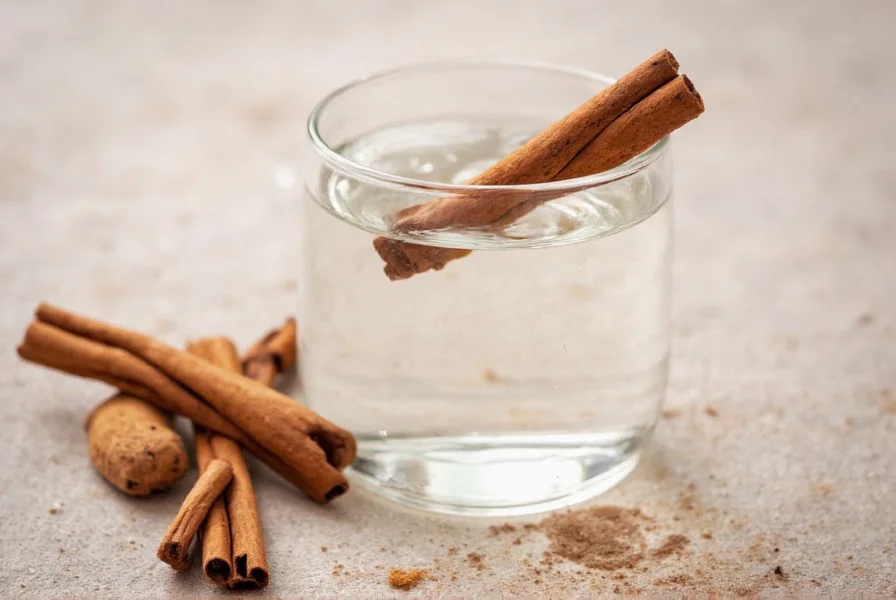Understanding Cinnamon Water: Science and Practical Applications
Cinnamon water has gained popularity as a natural wellness beverage, but separating evidence-based benefits from exaggerated claims requires careful examination. This simple preparation combines one of the world's oldest spices with water to create a beverage that may offer certain health advantages when consumed appropriately.
What Exactly is Cinnamon Water?
Cinnamon water refers to water that has been infused with cinnamon sticks or powder. The preparation process typically involves steeping cinnamon in hot or cold water for several hours, allowing compounds from the spice to dissolve into the liquid. Unlike commercial cinnamon supplements, this homemade preparation contains lower concentrations of active compounds but offers a natural way to incorporate cinnamon into daily routines.
Two primary cinnamon varieties exist: Ceylon ("true" cinnamon) and Cassia (more common and less expensive). Understanding this distinction is crucial for health considerations, as Cassia contains significantly higher levels of coumarin, a compound that can cause liver damage in excessive amounts.

Evidence-Based Health Benefits of Cinnamon Water
Research on cinnamon water specifically is limited, but studies on cinnamon consumption provide insight into potential benefits when prepared as a water infusion:
| Potential Benefit | Scientific Evidence | Recommended Consumption |
|---|---|---|
| Blood Sugar Regulation | Multiple studies show cinnamon may improve insulin sensitivity; effects are modest and temporary | 1/2 to 1 teaspoon daily, preferably with meals |
| Antioxidant Properties | Cinnamon ranks high in antioxidant capacity; water infusion transfers some polyphenols | Regular moderate consumption |
| Anti-inflammatory Effects | Preliminary research shows potential; human studies limited | As part of balanced diet |
| Heart Health Markers | Some studies show modest improvements in cholesterol levels | Long-term moderate consumption |
What Research Actually Says About Cinnamon Water
A 2020 meta-analysis published in Nutrition Journal reviewed 16 clinical trials examining cinnamon's effects on blood glucose. The analysis concluded that while cinnamon shows promise for modest improvements in fasting blood glucose (approximately 10-30 mg/dL reduction), these effects are temporary and shouldn't replace conventional diabetes management. The researchers noted that most studies used concentrated cinnamon extracts rather than simple water infusions, suggesting that cinnamon water likely provides milder effects.
Regarding weight loss claims, a comprehensive review in Obesity Reviews found no substantial evidence that cinnamon alone promotes significant weight loss. Any potential metabolic benefits would be minimal and work best as part of an overall healthy lifestyle, not as a standalone solution for weight management.
Proper Preparation of Cinnamon Water
Creating effective cinnamon water requires attention to preparation methods and cinnamon selection:
Cinnamon Selection Guidelines
- Ceylon cinnamon: Preferred for regular consumption due to lower coumarin content (approximately 0.017g coumarin per 100g)
- Cassia cinnamon: Contains significantly higher coumarin (approximately 6.97g per 100g); limit consumption to occasional use
- Recommended daily limit: No more than 1 teaspoon (2-4g) of Cassia cinnamon or 1-2 teaspoons of Ceylon cinnamon
Optimal Preparation Method
- Use 1 cinnamon stick or 1/2 teaspoon of powder per 8 ounces of water
- Add cinnamon to boiling water, then reduce heat and simmer for 10-15 minutes
- Allow to steep for an additional 30-60 minutes off heat
- Strain and consume warm or chilled
- Best consumed in the morning or before meals for potential blood sugar benefits

Safety Considerations and Potential Risks
While generally safe for most people in moderate amounts, cinnamon water presents certain considerations:
- Coumarin content: Cassia cinnamon contains high levels of coumarin, which can cause liver damage with prolonged excessive consumption. The European Food Safety Authority recommends a maximum daily intake of 0.1 mg coumarin per kilogram of body weight.
- Medication interactions: Cinnamon may interact with blood thinners, diabetes medications, and liver-metabolized drugs. Consult your healthcare provider if taking these medications.
- Allergic reactions: Some individuals may experience mouth sores or allergic reactions, particularly with direct contact from cinnamon powder.
- Pregnancy considerations: Limited evidence suggests moderation during pregnancy; consult your obstetrician.
Debunking Common Cinnamon Water Myths
Despite widespread claims, certain popular beliefs about cinnamon water lack scientific support:
- "Cinnamon water burns fat overnight": No evidence supports cinnamon as a fat-burning agent. Any weight effects would be minimal and related to potential blood sugar stabilization.
- "Cinnamon water cures diabetes": While cinnamon may offer modest blood sugar benefits, it cannot replace diabetes medication or management strategies.
- "More cinnamon equals better results": Excessive consumption increases coumarin exposure risk without providing additional benefits.
- "All cinnamon types are equally beneficial": Ceylon and Cassia differ significantly in coumarin content and potentially in health effects.
Practical Recommendations for Cinnamon Water Consumption
For those interested in incorporating cinnamon water into their wellness routine, evidence-based recommendations include:
- Choose Ceylon cinnamon for regular consumption to minimize coumarin exposure
- Limited to 1-2 cups daily, with no more than 1 teaspoon of Cassia or 1-2 teaspoons of Ceylon cinnamon
- Consume as part of a balanced diet rather than as a standalone health solution
- Monitor blood sugar levels if using for glucose management (for those with diabetes)
- Discontinue use if experiencing mouth irritation or other adverse effects
- Consult healthcare providers before using for specific health conditions
Conclusion: A Balanced Perspective on Cinnamon Water
Cinnamon water represents a simple, traditional preparation that may offer modest health benefits when prepared correctly and consumed in appropriate amounts. The scientific evidence supporting its use is promising but limited, particularly for the water infusion method compared to concentrated extracts used in many studies. As with any natural remedy, realistic expectations and attention to safety considerations are essential. When incorporated as part of an overall healthy lifestyle rather than viewed as a miracle solution, cinnamon water can be a pleasant addition to daily wellness practices.











 浙公网安备
33010002000092号
浙公网安备
33010002000092号 浙B2-20120091-4
浙B2-20120091-4